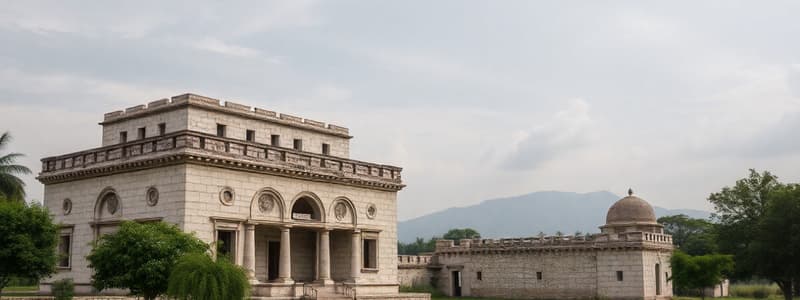Podcast
Questions and Answers
Which type of archaeology focuses on modern cultures and human interactions, often involving collaboration?
Which type of archaeology focuses on modern cultures and human interactions, often involving collaboration?
- Historical archaeology
- Anthropological archaeology (correct)
- Classical archaeology
- Prehistoric archaeology
The 'Neolithic Revolution' refers to the rapid urbanization of ancient societies.
The 'Neolithic Revolution' refers to the rapid urbanization of ancient societies.
False (B)
What is the term for the concept that cultural changes spread from key areas, rather than being formed independently?
What is the term for the concept that cultural changes spread from key areas, rather than being formed independently?
cultural diffusion
The direct-historical approach involves reconstructing the past in reverse chronological order, often using methods of ___________.
The direct-historical approach involves reconstructing the past in reverse chronological order, often using methods of ___________.
Match the following archeological concepts with their descriptions:
Match the following archeological concepts with their descriptions:
Flashcards
Prehistoric Archeology
Prehistoric Archeology
The study of societies before written history.
Neolithic Revolution
Neolithic Revolution
Transition from hunting-gathering to agriculture.
Cultural Diffusion
Cultural Diffusion
Spread of cultural changes from key areas.
Processual Archeology
Processual Archeology
Signup and view all the flashcards
Experimental Archeology
Experimental Archeology
Signup and view all the flashcards
Study Notes
Types of Archaeology
- Prehistoric/Non-historical Archaeology: Studies eras before written records, sometimes viewed negatively, as it is inherently limited by lack of written documentation.
- Historical Archaeology: Focuses on periods with written records, drawing on written sources to broaden understanding.
- Anthropological Archaeology: Investigates modern cultures and human interactions, often through collaborative research.
- Classical Archaeology: Specializes in ancient Rome, Greece and biblical studies.
- Zooarcheology: Examines non-human animal remains, excluding dinosaurs.
V. Gordon Childe's Contributions
- Neolithic Revolution: A shift from nomadic hunting and gathering to settled agricultural societies involving technological innovation.
- Urban Revolution: The transformation of small settlements into complex societies, as seen in ancient Mesopotamia.
- Cultural Diffusion: The dissemination of cultural traits from key regions, as opposed to independent development.
Approaches to Archaeology
- Classificatory-Historical Approach: Each society's development is unique, and chronologies are region-specific.
- Cultural Ecology: Focuses on how human societies adapt to their environment, affecting cultural and technological evolution.
- Direct-Historical Approach: The reconstruction of the past in reverse chronological order, aided by modern ethnographic studies. An example is the excavation of Starr Carr, the oldest known house in North Yorkshire.
Archaeological Sciences
- Advances in technology, such as calculators, computers, mapping techniques (GIS), are used in archaeological studies.
Processual Archaeology
- Lewis Binford: A key figurehead in processual archaeology.
- Emphasis on Science: Moves beyond classification, focusing on transitions, processes, and scientific principles; heavily reliant on positivism.
- Experimental Archaeology: Involves studying, recreating, and replicating material objects to better understand them.
Studying That Suits You
Use AI to generate personalized quizzes and flashcards to suit your learning preferences.




